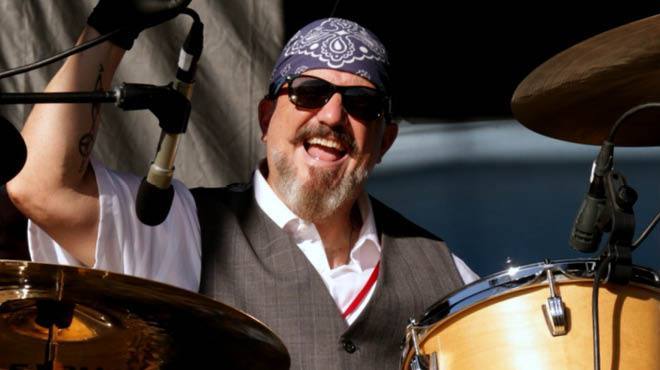
In his day job, John DiTulio is the go-to guy for clients needing high-level tech troubleshooting. But after-hours, he trades his computer for drumsticks, playing in rock and new country bands.
In 2020, this avid musician battled the effects of COVID-19, eventually gaining 35 pounds. Determined to regain his health in 2021, John lost weight, quit drinking and began working out with a trainer. When his left shoulder began twinging, he wondered if doing bench presses was the culprit, so he modified his routine.
Then the twinge became pain so bad he couldn't raise his arm to the side and parallel with the ground. John was diagnosed with calcific tendonitis, a condition in which calcium deposits build up on the tendons in the shoulder.
Despite physical therapy, nothing improved his range of motion or relieved the pain. The only solution offered was rotator cuff surgery.
Twenty years earlier, John had undergone rotator cuff surgery on his right shoulder, and he dreaded the long recovery. Most of all, he dreaded not being able to perform, ride his motorcycle or keep up his healthier lifestyle quest.
"So I researched the internet to see if there were any other treatments and came across the Hometown Health blog on the ultrasonic energy procedure," says John. "I thought, 'Huzzah! This could be it!'"
Also known as ultrasonic tenotomy, this minimally invasive procedure uses a needle-like device with an oscillating tip. The device is inserted through a 5-millimeter incision and acts like a jackhammer to target and remove calcifications and damaged tendon tissue.
The author of the blog was Jacob Erickson, D.O., a sports medicine specialist practicing at Mayo Clinic Health System in Onalaska, Wisconsin, three hours from John's home in Monroe, Wisconsin. "But I would have flown across the country to give this a try," he says.
John didn't need to book a flight. Instead, his first appointment was a virtual visit. Dr. Erickson explained the procedure, evaluated John's MRI with him and determined he was a candidate.
John liked all the benefits of the procedure, including no invasive surgery, only local anesthesia, a small incision, quick treatment time, short recovery period, and no sling or brace needed. So on Valentine's Day 2022, he underwent the procedure and three calcifications were removed.
"By the time I reached the parking lot, the chronic pain I'd been dealing with for months was gone. I kind of felt like I'd been hit in the shoulder with a 2-by-4, but over-the-counter medications helped relieved that," John says.
For three days, John babied his arm and began moving it a bit. At two weeks, he was given the go-ahead for greater movement, including gradually and slowly lifting his arm higher, simple weights and light physical therapy. His last follow-up was four weeks after the procedure.
John continues to work out, is down 30 pounds, and, best of all, about three months after the procedure, he performed with his band again. "Dr. Erickson is dynamite, and thanks to him and this procedure, I'm on the road to full recovery, pursuing a healthier lifestyle and doing what makes me happy."
This article first appeared on the Mayo Clinic Health System blog.








